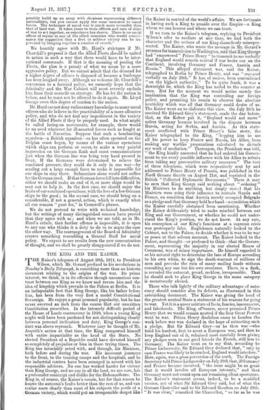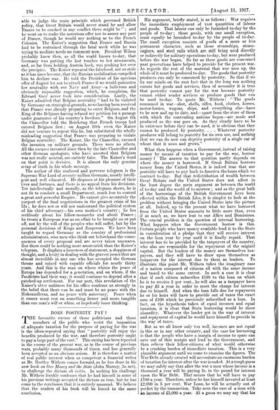THE KING AND THE KAISER.
TlIE Kaiser's telegram of August 10th, 1914, to President Wilson, which Mr. Gerard prefixed to his revelations in Monday's Daily Telegraph, is something more than an historio document relating to the origins of the war. Its prime interest, we think, is in its effective though unconscious con- trast between our King as we know and revere him ancl the idea of kingship which prevails in the Palace at Berlin. It is an indisputable fact that Ring George, like his father before him, has been from the very first a model Constitutional Sovereign. He enjoys a great personal popularity, but he has never swerved an inch from the course that our unwritten Constitution prescribes. In the intensely difficult period of the House of Lords controversy in 1910, when a young King might well have been pardoned for not distinguishing clearly between personal inclination and duty, King George's con- duct was above reproach. Whatever may be thought of Mr. Asquith's action at that time, the King comported himself with entire impartiality as the head of the State. No elected President of a Republic oould have divested himself so completely of prejudice or bias in those trying times. The King has invariably acted with, and through, his Ministers, both before and during the war. His incessant journeys to the front, to the training camps and the hospitals, and to the industrial centres have been arranged in accord with his responsible advisers. ,No one has worked harder for victory than King George, and no one in all the land, we are sure, has a profounder contempt and dislike for the Hohenzollerns. The King is, of course, the Kaiser's cousin, but for that reason he knows the autocrat's faults better than the rest of us, and can realize more clearly than most of his subjects the perils of a German victory, which would.put an irresponsible despot like
the Raiser in control of the world's affairs. We are fortunate in having such a King to preside over the Empire—a King whom we can honour and whom we can trust.
If we turn to the Kaiser's telegram, replying to President Wilson's offer to mediate at any time, we find both the character and the actions of our King shamelessly misrepre- sented. The Kaiser, who wrote the message in Mr. Gerard's presence for transmission to Washington, said that King George had "empowered" Prince Henry " to transmit to me verbally that England would remain neutral if war broke out on the Continent, involving Germany and France, Austria and Russia." This alleged statement was, said the Kaiser, telegraphed to Berlin by Prince Henry, and was " repeated verbally on July 29th." It has, of course, been contradicted " on the highest authority." To be quite frank, it was a downright lie, which the King has nailed to the counter at once. But for the moment we would notice merely the implication that the King was controlling our foreign policy, and promising his cousin to observe the absolute neutrality which was all that Germany could desire of us. The Kaiser went on to elaborate this view. On July 30th he received Sir Edward Grey's statement, made the day before, that, as the Kaiser put it, "England would not move" unless Germany became involved in the dispute between Russia, acting for Serbia, and Austria. As this state-
ment conflicted with Prince Henry's false story, the Kaiser telegraphed to the King, " begging him to use
all his power to keep France and Russia, his Allies, from making any warlike preparations calculated to disturb my work of mediation." Thereupon, the President was told, " the King kindly answered that he had ordered his Govern- ment to use every possible influence with his Allies to refrain from taking any provocative military measures." The text of these telegrams, which were respectively sent by and addressed to Prince Henry of Prussia, was published in the North German Gazette on August 21st, and reprinted in the British " Collected Diplomatic Documents." There it may be seen that King George said nothing about " ordering " his Ministers to do anything, but simply state.' that his Ministers wore using their influence to restrain Russia and France, on condition that Austria merely occupied Belgrade as a pledge and that Germany held her hand--a condition which the Kaiser carefully abstained from mentioning. Whether the Kaiser deliberately tried to make mischief between our King and our Government, or whether he could not under- stand the King's position, we do not know. At any rate, his conception of our King's functions at a supreme crisis was grotesquely false. Englishmen naturally looked to the Cabinet, not to the Palace, to decide whether it was to be war or peace at that solemn moment. The Kaiser looked to the Palace, and thought—or professed to think—that the' Govern- ment, representing the majority in our elected House of Commons, was of minor importance. He himself regarded it as his natural right to determine the fate of Europe according to his own whim, to sign the death-warrant of millions of men and provoke the ruin of many smiling lands without consulting any one but his own creatures. There, in a flash, is revealed the autocrat, proud, reckless, irresponsible. That he should seek to place King George in the same oategory is monstrously absurd.
Those who talk lightly of the military advantages of auto- cracy should consider also its defects, as illustrated in this astonishing document. The Raiser was giving the head of the greatest neutral State a statement of his reasons for going to war. Yet it is a queer mixture of facts, fancies, inaccuracies, and falsehoods. The King, of 'course, never promised Prince Henry that we would remain neutral if the four Great Powers went to war. Prince Henry doubtless came to London the week before war was declared in the hope of extracting such a pledge. But Sir Edward Grey—as he then was—who tried his hardest, first to avert a European war, and then to keep England out of it, refrained most carefully from giving any pledges even to our good friends the French, still less to Germany. The Kaiser went on to say that, according to Prince Lichnowsky, Sir Edward Grey declared that, " only in ease France was likely to be crushed, England would interfere." Here, again, was a gross perversion of the truth. The Foreign Secretary told Prince Liehnowsky on July 29th that, if Germany and France became involved, " the issue might be so great that it would involve all European interests," and that Germany must not count upon our remaining silent spectators. The Kaiser's statement seems, indeed, to be a muddled version, not of what Sir Edward Grey said, but of what the German Chancellor said to Sir Edward Gosehen on July 29th. " It was clear," remarked the Chancellor, " so far as he was
able to judge the main principle which governed British policy, that Great Britain would never stand by and allow France to be crushed in any conflict there might be " ; and he went on to make the notorious offer not to annex any part of France, though he would say nothing as to the French Colonies. The Kaiser's suggestion that France and Russia had to be restrained through the fatal week while he was trying to mediate needs no comment now. President Wilson probably knew then, as all the world knows to-day, that Germany was putting the last touches to her armaments, and, so far from holding Austria back, was pushing her over the precipice. The Kaiser repeated the falsehood, not so stale as it has since become, that the Russian mobilization compelled him to declare war. He told the President of his specious offer of August 1st not to attack France if we would guarantee her neutrality with our Navy and Army—a ludicrous and obviously impossible suggestion, which, he complains, Sir Edward Grey never took into consideration. Lastly, the Kaiser admitted that Belgian neutrality " had to be violated by Germany on strategical grounds, news having been received that France was already preparing to enter Belgium, and the King of the Belgians having refused my petition for a passage under guarantee of his country's freedom." On August 4th the Chancellor told the Reichstag that French troops had entered Belgium first ; on August 10th even the Kaiser did not venture to repeat this lie, but substituted the wholly misleading suggestion that France was preparing to violate Belgian neutrality. The Kaiser, like the Chancellor, excused the invasion on military grounds. There were no others. All the excuses invented since then by the late Chancellor and other German apologists, who have asserted that Belgium was not really neutral, are entirely false. The Kaiser's word on that point is decisive. It is almost the only genuine scrap of truth in his whole message. The author of this confused and perverse telegram is the Supreme War Lord of seventy million Germans, mostly intelli- gent and well educated. He disposes at his pleasure of their lives and fortunes, and there is no appeal from his decisions. Yet intellectually and morally, as the telegram shows, he is not fit to conduct a small Department, much less to control a great and powerful Empire. He cannot give accurately the purport of the final negotiations in the greatest crisis of his life ; he does not or will not understand the political system of his chief adversary—hie own mother's country ; he lies recklessly about his fellow-monarchs and about France ; ho treats a European war as an affair to be brought on or put off, not by the will of the peoples who will suffer, but by the personal decisions of Kings and Emperors. We have been taught to regard Germane as the country of professional administrators, wise men who think out beforehand the conse- quences of every proposal and are never taken unawares. But there could be nothing more amateurish than the Kaiser's telegram. It displays a looseness of statement, a sloppiness of thought, and a levity in dealing with the gravest issues that are almost incredible in any one who has occupied the German throne and mixed with capable officials for nearly thirty years. And this is the man on whose whims the peace of Europe has depended for a generation, and on whom, if the Pacificists had their, way, it would continue to depend after a patched-up settlement. For our part, this revelation of the Kaiser's utter unfitness for his office confirms us strongly in the belief that there can be and must be no peace with the Hohenzollern, and no peace with autocracy. Peace when it comes must rest on something firmer and more tangible than one man's will or whim, or hopelessly loose thinking.



























 Previous page
Previous page